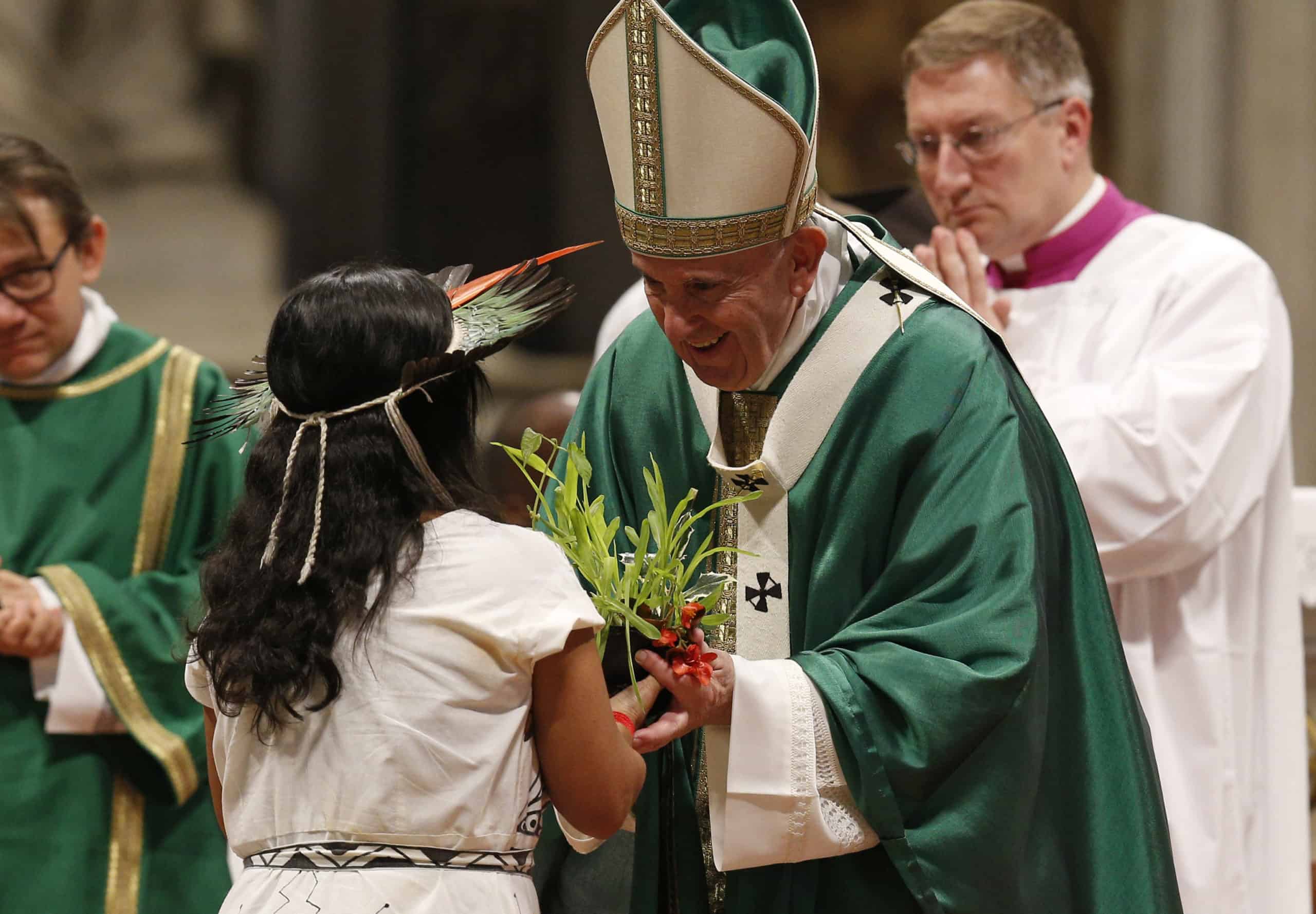Pope Francis released his latest apostolic exhortation today: Querida Amazonia, a follow up to the “Amazon Synod”, or Synod of Bishops for the Pan-Amazonian Region, which was held in October 2019. The full text (24 pages) shows how the Holy Father understands the Church’s role both in that region and universally.
The document is divided into four interrelated “dreams” for the Amazon. To give you a sense of the document, here are some highlights:
Social Dream
I dream of an Amazon region that fights for the rights of the poor, the original peoples and the least of our brothers and sisters, where their voices can be heard and their dignity advanced. (7)
1. “We do not need an environmentalism ‘that is concerned for the biome but ignores the Amazonian peoples.’” (8)
2. “The Amazon region has been presented as an enormous empty space to be filled, a source of raw resources to be developed, a wild expanse to be domesticated. None of this recognizes the rights of the original peoples; it simply ignores them as if they did not exist, or acts as if the lands on which they live do not belong to them.” (12)
3. “The businesses, national or international, which harm the Amazon and fail to respect the right of the original peoples to the land and its boundaries, and to self-determination and prior consent, should be called for what they are: injustice and crime.”(14)
Cultural Dream
I dream of an Amazon region that can preserve its distinctive cultural riches, where the beauty of our humanity shines forth in so many varied ways. (7)
4. “Here I would like to point out that ‘a consumerist vision of human beings, encouraged by the mechanisms of today’s globalized economy, has a leveling effect on cultures, diminishing the immense variety which is the heritage of all humanity’. This especially affects young people, for it has a tendency to ‘blur what is distinctive about their origins and backgrounds, and turn them into a new line of malleable goods.'” (33)
5. “Starting from our roots, let us sit around the common table, a place of conversation and of shared hopes. In this way our differences, which could seem like a banner or a wall, can become a bridge. Identity and dialogue are not enemies. Our own cultural identity is strengthened and enriched as a result of dialogue with those unlike ourselves. Nor is our authentic identity preserved by an impoverished isolation.” (37)
Ecological Dream
I dream of an Amazon region that can jealously preserve its overwhelming natural beauty and the superabundant life teeming in its rivers and forests. (7)
6. “In a cultural reality like the Amazon region, where there is such a close relationship between human beings and nature, daily existence is always cosmic. Setting others free from their forms of bondage surely involves caring for the environment and defending it, but, even more, helping the human heart to be open with trust to the God who not only has created all that exists, but has also given us himself in Jesus Christ. The Lord, who is the first to care for us, teaches us to care for our brothers and sisters and the environment which he daily gives us. This is the first ecology that we need.” (41)
7. “Let us awaken our God-given aesthetic and contemplative sense that so often we let languish. Let us remember that ‘if someone has not learned to stop and admire something beautiful, we should not be surprised if he or she treats everything as an object to be used and abused without scruple.’” (56)
Ecclesial Dream
I dream of Christian communities capable of generous commitment, incarnate in the Amazon region, and giving the Church new faces with Amazonian features. (7)
8. “An authentic option for the poor and the abandoned, while motivating us to liberate them from material poverty and to defend their rights, also involves inviting them to a friendship with the Lord that can elevate and dignify them. How sad it would be if they were to receive from us a body of teachings or a moral code, but not the great message of salvation, the missionary appeal that speaks to the heart and gives meaning to everything else in life.” (63)
9. “[T]he indigenous peoples of the Amazon Region express the authentic quality of life as ‘good living.’ This involves personal, familial, communal and cosmic harmony and finds expression in a communitarian approach to existence, the ability to find joy and fulfillment in an austere and simple life, and a responsible care of nature that preserves resources for future generations.” (71)
10. “It is possible to take up an indigenous symbol in some way, without necessarily considering it as idolatry. A myth charged with spiritual meaning can be used to advantage and not always considered a pagan error. Some religious festivals have a sacred meaning and are occasions for gathering and fraternity, albeit in need of a gradual process of purification or maturation.” (79)
11. “In a synodal Church, those women who in fact have a central part to play in Amazonian communities should have access to positions, including ecclesial services, that do not entail Holy Orders and that can better signify the role that is theirs.” (103)


